| |
| |
Part 1: For the young ones:
Two-stroke |
|
|
|
|
| |
|
|
| |
|
KX60
Model name:
KX60-B16 |
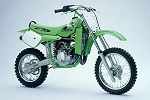 |
 |
|
Power, weight & seat height |
|
15hp, 50.5 kg, 710 mm |
|
Smallest Kawasaki
Motocross for 2000 was this hard hitting 60ccm bike. A good
start for the youngster wanting to start in motocross. The Kawasaki KX60
is the smallest true motocross bike
Kawasaki build and
just the right size for a future champion to learn to ride on.
KAWASAKI KX60 Features
and Benefits
-
A
strong rider friendly power plant, liquid-cooled just like the
professionals use.
-
An
engine producing good power and torque at all rpm.
-
6-Speed Transmission
-
High
Tensile Steel Frame
-
Uni-Trak Rear Suspension
-
Nitrogen-Charged Shock
-
Works-Type Seat, makes it easy to shift your weight forward for more
front wheel bite in the turns.
|
|
| |
|
| |
|
| |
Modifications for 2000: |
|
|
| |
|
|
| |
|
KX65 |
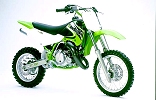 |
 |
|
Power, weight & seat height |
|
16.7hp, 57 kg, 760 mm |
|
NEW model for 2000.
For years, actually for 16 years Kawasaki have had the KX60 as a fast
mini crosser. The KX60 have almost had no updates in it whole life so a
new more modern bike was highly wanted.
The new KX65 have
the looks of its bigger brothers of the same time. The engine was
bigger then the KX60 and was highly updated. It got 1.5 mm increased
bore,
which is electro fusion-coated for strength and longevity. Combined with
larger airbox, air cleaner and intake duct, the new motor pumps out
significantly greater horsepower and torque. The cylinder was moved to
the left in the frame to accommodate the new exhaust port and exhaust
pipe - tucking the pipe in where it won't burn the rider's leg. The new
pipe comes with a removable, aluminium silencer. More horsepower means
more heat, so Kawasaki provides the KX65 with a new, larger radiator and
a redesigned water pump.
The chassis was
brand new with updated uni-track rear suspension, front forks was
bigger.
With aluminium rims and disk brakes both front and rear, the KX65
completes a package designed for the serious young racer -- not the
trail rider. |
|
| |
|
| |
|
| |
Modifications for 2000: |
New
bike |
|
| |
|
|
| |
|
KX80 |
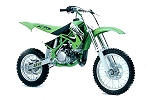 |
|
KX80 Small wheels
|
|
- |
|
KX80-II Big wheels
|
 |
|
Power, weight & seat height |
|
27.2hp, 68kg, 840-870mm |
|
Many of the
world's top riders got their start riding Kawasaki KX80 Junior Motocross
machines. The KX80's have been incredibly successful winning Junior
championships all over the world.
There are two models, KX80 and KX80-II, the difference are the wheels
the KX80 have 17in front and 14 in. rear wheel, the KX80-II (also called
Big wheel) have 19 in. front and 16 in. rear wheel. When you outgrow the
normal Junior motocross bikes but you are not yet ready for a 125,
Kawasaki has the solution. Go for the KX80-II, bigger diameter wheels
mean a higher seat and more ground clearance and an easier bike to
handle when the standard size bikes have become too small.
The KX80 provides plenty
of power, thanks to its liquid-cooled, two-stroke, single-cylinder 82cc
engine. It’s equipped with high-tech features, such as an Electro
fusion-coated cylinder with a narrow squish band and large volume to
enhance top-end power. Fuel delivery for the engine is provided by a
26mm carburettor. A Kawasaki Integrated Power-valve System (KIPS®) and
exhaust pipe capped with a KX250-style muffler complement the KX80.s
tractable power band, which is easy to control for riders of varying
skill levels. A smooth-shifting six-speed transmission. The KX80
utilizes a high-tensile steel perimeter frame, and a specially designed
gas tank sits inside the frame, lowering the fuel load and centre of
gravity for improved handling, yet another design borrowed from the
bigger KX motorcycles. Long-travel suspension features a 36mm inverted
cartridge front fork that has the capability of 18-way compression
damping adjustment. Out back, the spring preload, compression and
rebound damping are all adjustable on the UNI-TRAK rear suspension
system.
|
|
| |
|
| |
|
| |
Modifications for 2000: |
Last year
for the KX80, will be replaced bye the KX85 for 2001. |
|
| |
|
|
| |
|
KX125
Model name:KX125-L2 |
 |
 |
|
Power, weight & seat height |
|
39.5 hp, 87kg,
945mm |
|
For 2000 the KX125 receive
an all-new bladder-type front fork, used currently on the factory race
bikes, that should provide smoother response. The outer fork tubes have
smoother internal surfaces for better action, improved dust seals and
the fork assembly is equipped with new, stiffer 0.43 kg/mm springs (0.41
kg/mm for the KX125). The rear shock has revised settings to match the
new fork and also features both high and low speed compression damping
adjustments.
The engine have got
revised ports for better low- and mid-range power, a redesigned exhaust
pipe, increased cylinder head volume, revised carburettor jetting, an
increased intake manifold and a heavier flywheel.
According to this changes, the 2000
KX125 is a lot faster than last year's stock bike. The new model
apparently has much better low-end -- something missing from last year's
bike. This is good news for Kawasaki fans, many of whom love the sweet
handling chassis of the KX125, but have been waiting for Kawasaki to
make the stock motor more competitive. |
|
| |
|
| |
|
| |
Modifications for 2000: |
Updated
engine, new front and rear suspension |
|
| |
|
|
| |
|
KX250
Model name:
KX250-L2 |
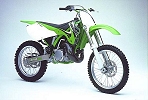 |
 |
 |
|
Power, weight & seat height |
|
55hp, 97kg, 945mm |
|
The KX 250 double the capacity of the KX125,
ad 10 kilos of frame and suspension and you have the KX250.
As the 125, the 250
received many new features and change's to help improve power and durability.
For
2000 the KX250 receive an all-new bladder-type front fork, used
currently on the factory race bikes, that should provide smoother
response. The outer fork tubes have smoother internal surfaces for
better action, improved dust seals and the fork assembly is equipped
with new, stiffer 0.43 kg/mm springs (0.41 kg/mm for the KX125). The
rear shock has revised settings to match the new fork and also features
both high and low speed compression damping adjustments.
Changes to the 249cc
liquid-cooled engine include smaller main and sub-exhaust ports with the
sub port moved closer to the main port for improved power; new valve
timing for smoother delivery and to prevent fluttering; all-new
carburettor jetting, ignition timing and an air guide wing. The con-rod
has been made stronger and the transmission has been tweaked to improve
shifting.
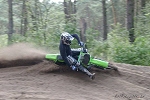 |
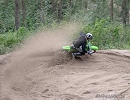 |
Source:
BikePics |
 |
|
|
Y2K 250 Motocross
Shootout |
|
|
| |
|
| |
|
| |
Modifications for 2000: |
Updated
engine, new front and rear suspension |
|
| |
|
|
| |
|
The
biggest and strongest you get, the KX500. Power for the KX500 comes from
a liquid-cooled 499cc two-stroke witch pumps out big-bore
horsepower for the entire rpm range. There are powerful front and rear
disc brakes provide aggressive stopping power, and fully adjustable
suspension components. Incredibly
fast and never lacking for torque, it is made for the experienced racer
who wants a machine that never ceases to amaze with its ability to win
high-speed desert races, climb the steepest hill or manoeuvre through
the most challenging Hare & Hound course. A string of racing victories,
including nine Baja 1000 championships and nine AMA National Hare &
Hound championships, prove this Kawasaki is the king of KX motocross
bikes. The KX500 have not been so frequently updated as the 125
and 250 but its still a modern motocross bike with all the right
equipment.
Features and Benefits: Electro fusion cylinder improves heat transfer for
consistent power output, porous design holds lubrication well and
resists abrasion and seizure and allows closer engine tolerances for more horsepower.
Liquid Cooling for even-running temperatures helps ensure consistently strong power
output.
KIPS-D
Controls exhaust port height to provide optimum exhaust timing at all
rpm and produces a broader power band, more low-end torque and more top-end
power, bleeds down compression pressure at cranking speeds, making
kick-starting a breeze.
39mm Crescent Slide Carburettor for smooth transitions at intermediate throttle openings at
all rpm.
High-tensile Steel Frame, semi-double cradle design with bolt-on
aluminium rear section and race-proven frame geometry offers nimble turning and unmatched
stability.
46mm Upside-down Cartridge Fork offer great rigidity for a
confidence-inspiring ride without a weight penalty. 18-way rebound and compression damping adjustments are provided to
fine tune for different riders and conditions.
UNI-TRAK® Rear Suspension with lightweight aluminium-constructed swingarm keeps weight to a minimum. 20-way compression and 18-way rebound-damping adjustment, along with
spring preload adjustability, allow the rider to fine tune rear
suspension.
Triple-bearing Rear Hub, two ball bearings on the drive side of the hub and the brake side help
ensure durability. Rear hub oil seals improve bearing durability
and hollow rear axel reduces weight
|
|
| |
|
| |
|
| |
| |
How good was
the KX range in 2000? Well take a look at Ricky Carmichael (see
Wikipedia link below) and what he brought Kawasaki up to in
Motocross (MX1) / Supercross (SX1). When he rode for Kawasaki
from 1997 to 2001 he took Kawasaki to the top EVERY year!!!
1997 AMA 125
National Champion (Kawasaki), 1998 AMA 125 East Coast SX
Champion (Kawasaki) , 1998 AMA 125 National Champion (Kawasaki)
, 1999 AMA 125 National Champion (Kawasaki), 2000 AMA 250
National Champion (Kawasaki), 2000 U.S. Open of Supercross
(Kawasaki), 2001 AMA 250 Supercross Champion (Kawasaki), 2001
AMA 250 National Champion (Kawasaki) |
|
 |
 |
|
|
|
|
|
Ricky Carmichael
|
2000 AMA 250 Outdoor
National Motocross Preview |
|
|
|
|
|
|
|
| |
| |
Kawasaki model
information in PDF Format. |
|
| |
 |
|
|
|
|
|
|
|
|
|
| |
KX60 |
|
|
|
|
|
|
|
|
|
|
|
| |
Page made:
22.03.2008 |
Last updated: |
05.06.2016 |
|
|
|
|
|
|
| |
| KX60 |
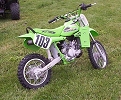 |
| |
|
|
| |
|
| |
|
| |
|
|
| |
| KX65 |
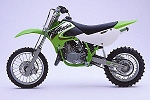 |
| |
|
|
| |
|
| |
|
| |
|
|
| |
| KX65 |
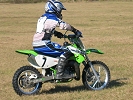 |
| |
|
|
| |
|
| |
|
| |
|
|
| |
|
|
| |
|
|
| |
|
|
| |
|
|
| |
|
|
| |
|
|
| |
|
|
| |
|
|
| |
|
|
| |
|
|
| |
|
|
| |
|
|
| |
|
|
| |
|
|
| |
| KX500 |
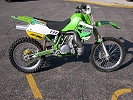 |
| |
|
|
| |
|
|
| |
| KX500 |
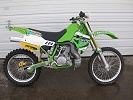 |
| |
|
|
| |
|
|
| |
|
|
|

